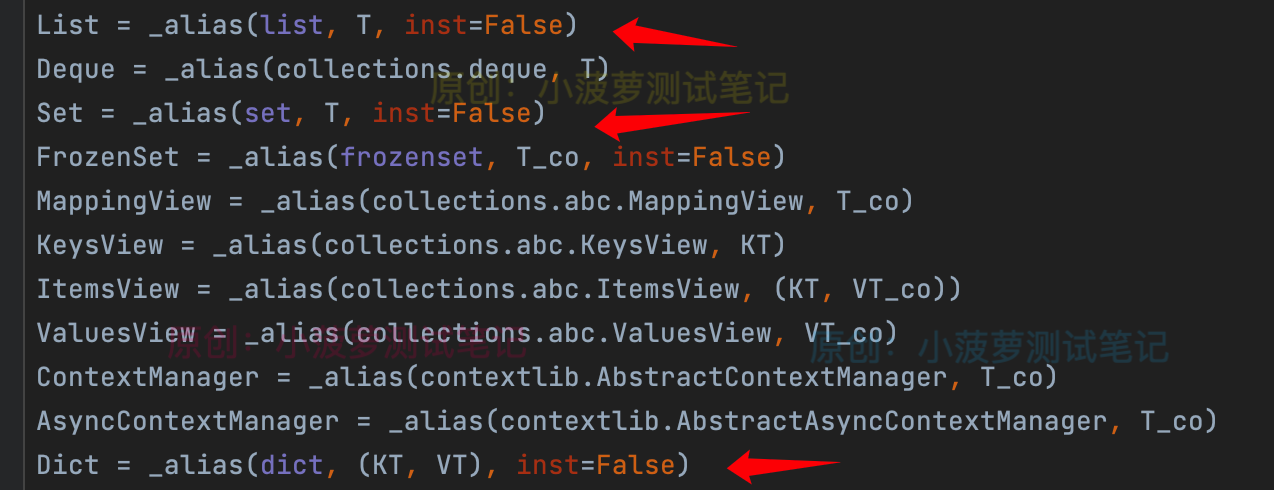Python - typing 模块 —— 常用类型提示
前言
typing 是在 python 3.5 才有的模块
前置学习
Python 类型提示:https://www.cnblogs.com/poloyy/p/15145380.html
常用类型提示
- int,long,float: 整型,长整形,浮点型;
- bool,str: 布尔型,字符串类型;
- List, Tuple, Dict, Set:列表,元组,字典, 集合;
- Iterable,Iterator:可迭代类型,迭代器类型;
- Generator:生成器类型;
前两行小写的不需要 import,后面三行都需要通过 typing 模块 import 哦
常用类型提示栗子
指定函数参数类型
单个参数
# name 参数类型为 str def greeting(name: str) : return "hello"
多个参数
# 多个参数,参数类型均不同 def add(a: int, string: str, f: float, b: bool or str): print(a, string, f, b)
bool or str:代表参数 b 可以是布尔类型,也可以是字符串
指定函数返回的参数类型
简单栗子
# 函数返回值指定为字符串 def greeting(name: str) -> str: return "hello"
复杂一点的栗子
from typing import Tuple, List, Dict # 返回一个 Tuple 类型的数据,第一个元素是 List,第二个元素是 Tuple,第三个元素是 Dict,第四个元素可以是字符串或布尔 def add(a: int, string: str, f: float, b: bool or str) -> Tuple[List, Tuple, Dict, str or bool]: list1 = list(range(a)) tup = (string, string, string) d = {"a": f} bl = b return list1, tup, d, bl # 不 warn 的调用写法 print(add(1, "2", 123, True)) # 输出结果 ([0], ('2', '2', '2'), {'a': 123}, True)
List、Set、Dict 的源码

能大概猜到,它们底层跟 list、set、dict 有关系
Tuple 的源码

跟其他三个不太一样,但也是跟 tuple 有关系
那指定类型的时候用 list、set、dict、tuple 可不可以呢?
可以是可以,但是不能指定里面元素数据类型
def test(a: list, b: dict, c: set, d: tuple): print(a, b, c, d)
List[T]、Set[T] 只能传一个类型,传多个会报错

a: List[int, str] = [1, "2"] b: Set[int, str] = {1, 2, 3}
IDE 不会报错,但运行时会报错
Traceback (most recent call last): File "/Users/polo/Documents/pylearn/第二章:基础/13_typing.py", line 36, in <module> a: List[int, str] = [1, "2"] File "/Library/Developer/CommandLineTools/Library/Frameworks/Python3.framework/Versions/3.8/lib/python3.8/typing.py", line 261, in inner return func(*args, **kwds) File "/Library/Developer/CommandLineTools/Library/Frameworks/Python3.framework/Versions/3.8/lib/python3.8/typing.py", line 683, in __getitem__ _check_generic(self, params) File "/Library/Developer/CommandLineTools/Library/Frameworks/Python3.framework/Versions/3.8/lib/python3.8/typing.py", line 215, in _check_generic raise TypeError(f"Too {'many' if alen > elen else 'few'} parameters for {cls};" TypeError: Too many parameters for typing.List; actual 2, expected 1
大致意思就是:List 传了太多参数,期望 1 个,实际 2 个
那 Tuple[T] 传多个会报错吗?
d: Tuple[int, str] = (1, "2") print(d) # 输出结果 (1, '2')
是不会报错的
再来看看 Tuple[T] 的多种写法

只写一个 int,赋值两个 int 元素会报 warning
如果 Tuple[T] 指定类型数量和赋值的元素数量不一致呢?
d: Tuple[int, str] = (1, "2", "2")

不会报错,但是也会有 warning
综上两个栗子,得出结论
Tuple[T] 指定一个类型的时候,仅针对同一个索引下的元素类型
如果想像 List[T] 一样,指定一个类型,可以对所有元素生效呢
d: Tuple[int, ...] = (1, 2, 3) d: Tuple[Dict[str, str], ...] = ({"name": "poloyy"}, {"age": "33"})
指定一个类型后,在后面加个 ... 就行
类型别名
https://www.cnblogs.com/poloyy/p/15153883.html
NewType
https://www.cnblogs.com/poloyy/p/15153886.html
Callable
https://www.cnblogs.com/poloyy/p/15154008.html
TypeVar 泛型
https://www.cnblogs.com/poloyy/p/15154196.html
Any Type
https://www.cnblogs.com/poloyy/p/15158613.html
Union
https://www.cnblogs.com/poloyy/p/15170066.html
Optional
https://www.cnblogs.com/poloyy/p/15170297.html


 浙公网安备 33010602011771号
浙公网安备 33010602011771号